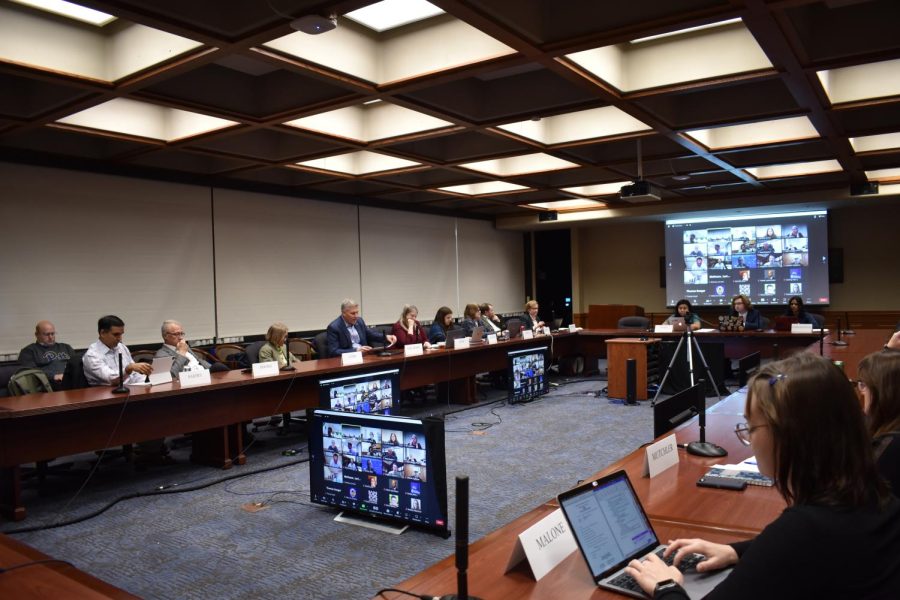Senate Council discusses pause on University vaccination requirements, passes drone policy
Alyssa Carnevali | Staff Photographer
Senate Council at its monthly meeting on Wednesday in Posvar Hall.
February 23, 2023
Chancellor Patrick Gallagher opened this month’s Senate Council meeting by acknowledging the University’s aid and support for those affected by the recent earthquakes in Turkey and Syria.
“I know that there’s many selfless and anonymous acts of generosity across our community,” Gallagher said. “I just want to appreciate and thank all those for doing so.”
Senate Council held its monthly meeting on Wednesday afternoon in-person in Posvar Hall and over Zoom. The council discussed the University’s success with Black History Month events, University vaccinations and immunizations and a newly passed drone policy.
Gallagher touched on recent Black History Month events, including the grand opening of the August Wilson Archive in Hillman Library and an ongoing performance of Wilson’s play “Seven Guitars” by Pitt Theater. He also recognized the Archives and Special Collections of the University Library System as a “crown jewel” of the University.
“The library processed the archive in record time and it was actually opened for public use beginning in January,” Gallagher said. “So we already have researchers and scholars around the world using this unique resource.”
Gallagher also shared updates on Pitt Day of Giving donations and said that the University received over 14,000 gifts from 9,450 donors. Over $2.4 million was raised and around 1,000 graduates from the last decade also contributed gifts.
Senate Council President Robin Kear discussed the recent addition of 11 proposals and counterproposals on the faculty unionization website. Some of these proposals include academic freedom, part-time appointment and union communication.
“I’m glad for this transparency as I know we would all like to be informed as we can on what is being negotiated on faculty’s behalf,” Kear said. “I urge all sites to disclose as much written text of these articles and proposals as possible.”
Kear also mentioned that 14 policies surrounding grading and academic policies are up for decommissioning but that there was concern from the Educational Policies Committee about shared governance as the policies move into the Provost Office.
According to Kear, the University’s vaccination and immunization policy is now on pause due to “uncertainty in the federal environment and medical advice regarding COVID vaccination.” Before the pause, a draft of the policy was open for public comment since last fall and endorsed by the Senate benefits and welfare committee during its meeting on Jan. 19.
“I am hopeful that this continues because not only does this work help to protect campus, the policy also helps to streamline student vaccination requirements and other vaccine requirements for certain kinds of work in labs,” Kear said.
The current policy states that all University employees and postdoctoral fellows must be vaccinated against COVID-19 and all undergraduate and graduate students must be vaccinated against additional diseases like chickenpox and measles. It will remain the same until University leadership unpauses the draft in late spring or early summer.
Student Government Board President Danielle Floyd also addressed the recent SGB resignations during the meeting and said they are actively reviewing the process of how individuals are appointed.
“I think for each resignation that has taken place it’s been for personal reasons,” Floyd said. “There’s no big mysterious reasons.”
Catherine Wood, co-chair of the research committee, discussed the University drone policy that passed last week at the Faculty Assembly. Wood said the policy arises from the “expanding applications” of drone use in areas such as marketing, athletics and security management.
“Governance, and hence the creation of a university policy, is needed to ensure safe and lawful operation of drones,” Wood said. “So the scope of the policy applies to indoor and outdoor drone operation on behalf of the university or on its property.”
Wood said the policy “provides a framework for acceptable uses of drones” in commercial and educational uses, defines different types of flight in compliance with FAA guidelines and outlines prohibited use of drones on University property.
The policy passed with 31 votes in favor and three abstentions.








